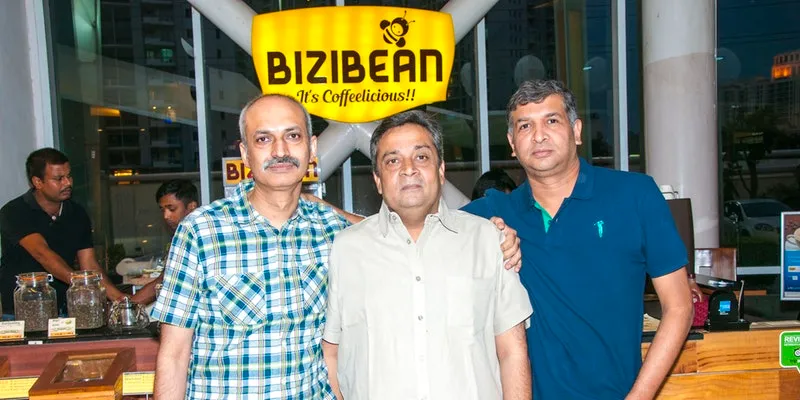How Delhi-based coffee chain BiziBean managed to earn profits from Day 1
BiziBean, a chain of coffee joints, aims to change the at-home coffee consumption experience with high quality coffee sourced directly from Indian farmers and made available at an affordable price.
The culture of coffee consumption is serious business across the globe with big corporations, speciality coffee houses, artisanal cafes, and the local barista all cashing in on the brew experience.
And doing its bit to bring a subliminal coffee drinking experience to the Indian aficionado is Delhi-based BiziBean.
Says Co-founder Aharnish Mishra, “A coffee can offer one of the most complex sensory experiences of all the foods and beverages known to mankind.” His brand claims to reinstate coffee’s speciality rooted in the spirit of ‘Make in India’.

Bizibean Co-Founders
Started in 2014 by coffee fanatics Aharnish, Raj Singh, and Manideep Chhokra, BiziBean is essentially a chain of coffee joints where one can drink coffee brewed from locally sourced coffee beans, roasted and blended in small batches. And if you like the coffee, you can buy BiziBean roasts and take them home as well.
With the takeaway blends, BiziBean aims to change the at-home coffee experience with high-quality coffee sourced directly from Indian farmers and made available at an affordable price.
Coffee roots
It all started in 2004, when Manideep and Aharnish left their corporate jobs to follow their passion for coffee and started a B2B business in the R&G (roast and ground) coffee segment.
After 10 years, both decided to foray into the retail segment as they felt a gap in the market for a speciality coffee café where customers can have access to freshly roasted coffee, a variety of blends, roasts and origins, and make a choice after sampling a coffee, all at an affordable price. This led to BiziBean in 2014 along with another friend and a coffee connoisseur Raj, with an initial investment of Rs 5 lakh.
“We wanted to serve Delhi NCR with freshly-roasted gourmet coffee and coffee-based beverages,” says Aharnish. At all BiziBean outlets, coffee is offered in many different varieties like Indian filter coffee, pour over, and AeroPress.
Despite the Baristas, Cafe Coffee Days, and Starbucks, Aharnish feels that they stand out because, as for BiziBean, coffee is the hero.
“We aim to differentiate by staying true to coffee and trying to penetrate the in-home consumption market. The coffee chains have stopped being about coffee and are transforming into QSR outlets with a major focus on food,” says Aharnish.
He puts BiziBean in the market of organised café market, which Aharnish claims is a market size between Rs 1,200 crore and Rs 3,000 crore per annum with a CAGR of more than 12 percent.
Business model
The chain has received angel funding of nearly Rs 2 crore till date, and with this the company has enjoyed a consistent growth rate of more than 100 percent year on year, right since inception. “Starting from a single outlet, one city, and five employees to more than 50 touchpoints in 13 cities and 200-plus staff strength in a short span of five years, growth has been great,” says Aharnish.
He attributed the growth to BiziBean’s sustainable business model, which shuns the traditional café format in favour of kiosks, concession stands, store-within-a-store, and office tuck shops. Aharnish explains,
“This approach helps us in keeping the capital investment down, increase our reach and penetration, keep the prices low, and enable quicker execution time. All of our outlets are COCO (company owned-company operated) with no franchisees."
He adds that BiziBean sources coffee on the auction model, which keeps the capital in control. “The auction model is a pure price discovery mechanism. When we use specific grades of coffee for our blends, we do not differentiate between growing regions and plantations, and only consider the sieve size of a bean. For sourcing of greens, instead of directly contacting the individual planter or cooperative, we buy from aggregators using the auction prices as a guide. This is a kind of de-risking strategy, as we are not bound to any specific planter or region for our blends. This model protects us from price shocks and crop failures,” he says.
Championing the bean
The founders believe that good coffee and good wine have many things in common, one of them being the concept of terroir.
Terroir in coffee, as in wine, is a word that expresses everything about the geographic region of that particular bean such as its soil, the weather conditions, and climate, all of which give each coffee its taste and character. And that's why BiziBean believes that a great cup of coffee must start its journey from the very best green beans.
Aharnish explains that as green coffee is roasted it creates hundreds of flavour compounds that contribute to a vast array of aromatics and nuances. “Every grade, every harvest, and every lot has different intrinsic characteristics and BiziBean’s roastmaster develops roast profiles that allow the coffees to bring out their individuality,” he adds.
BiziBean begins the coffee-making process with 100 percent green beans and sources the coffees exclusively from Indian speciality grades, which comprise the top 10 percent of the total India crop, claims Aharnish.
Some of these grades include the internationally acclaimed Monsooned Malabar AA, and Mysore Nuggets Extra Bold green bean, Plantation AA, and Robust Kapi Royale. “Apart from India coffees, we also roast a few international coffees, including Brazilian Supremo, Guatemalan, and Colombian Supremo,” he says.

When it comes to roasting coffee, BiziBean is driven by two principles: artisanal style and freshness. The artisanal style roasting relies on roastmasters’ skills and senses to craft the coffee, as every bean is different and requires individual attention. This handcrafted style of roasting is often described as the third wave of coffee. The artisanal style can only be practised on small batch sizes and hence, the company sells the artisanal roasted coffee only on demand.
“We can think of this as made-to-order model where we roast our coffees only on order from our customers. This ensures that the coffees will always be fresh when it reaches the store,” Aharnish adds.
What’s brewing next
While he does not share revenue figures, the co-founder says that the company has been profitable throughout.
In the last five years, BiziBean has expanded to 11 outlets in Delhi NCR, and three stores, 37 concession stands across India PVR Cinemas, Spencer Retail, and Modern Bazar across 13 cities in India. Apart from the physical stores, the company also sells coffee via its website. The brand has approximately served over one million cups of coffee in the last financial year.
BiziBean is now planning to double its outlet count to 80 by March 2020 and 150 by March 2021. It is also now seeking external funding in the current financial year to support its growth plans.
(Edited by Evelyn Ratnakumar)










